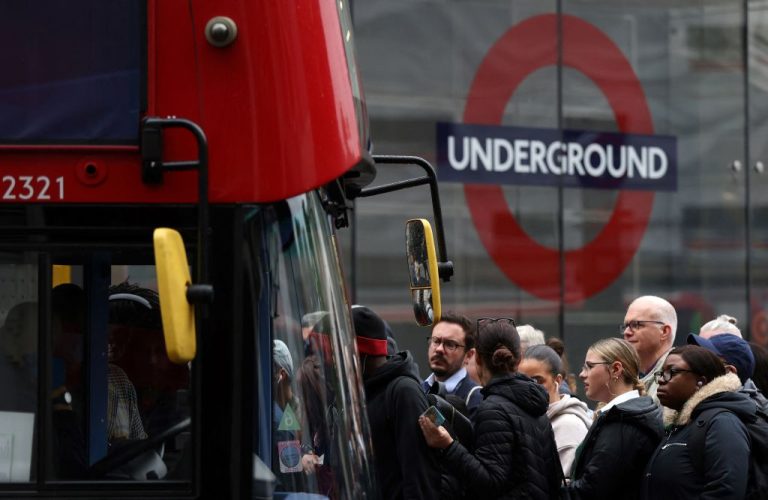A massive union-led strike is set to disrupt the United Kingdom’s train service throughout all of the week of June 24, reports state.
UK-based iNews has covered the strike as “Britain’s biggest rail strike in almost a century.”
The source of the conflict appears to be the Rail, Maritime, and Transport (RMT) union scheduling a planned walkout at the Network Rail and 13 Train operators for June 21, 23, and 25.
Financial Times stated the operation would see 40,000 workers not show up for their positions, reducing Network Rail’s capacity to 4,500 trains from more than 20,000.
A Press Release on the RMT website states the union will walk out “due to the inability of the rail employers to come to a negotiated settlement with RMT.”
MORE ON UNIONS IN THE ECONOMIC CRISIS
- Workers United Starbucks NLRB Complaints Underscore Red Hues of Unionization Movement
- Public Employee Union-led Counter Protest Against Freedom Convoy Flies Hammer and Sickle Flag
- US Rail Carriers Are Cutting Fertilizer, Grain, Coal Shipments Amid Union Dispute
- CP Rail Blaming Union for Work Stoppage Threatening Canadian Farm Output
Success
You are now signed up for our newsletter
Success
Check your email to complete sign up
“Network Rail and the train operating companies have subjected their staff to multiyear pay freezes and plan to cut thousands of jobs which will make the railways unsafe,” it adds. “Despite intense talks with the rail bosses, RMT has not been able to secure a pay proposal nor a guarantee of no compulsory redundancies.”
The message added that London Underground RMT members will likewise walkout on June 21 amid a secondary dispute.
In specific, the union cited a UK inflation rate of 11.1 percent and an overall cost of living crisis, “iI is unacceptable for railway workers to either lose their jobs or face another year of a pay freeze,” they stated.
iNews analyzed the impact would be such as, “Fewer than one in five trains are likely to run, and only between 7am and 7pm, probably only on main lines…The strikes threaten widespread travel disruption during a number of major events, including concerts, Test match cricket and the Glastonbury festival.”
In a secondary June 8 article, the outlet opined that the disruption would not only affect citizen commuters, but the country’s supply chain, as Director General of Rail Freight Group Maggie Simpson described the strike as, “As bad as it gets for rail freight, with disruption likely across the entire week and into the weekend.”
iNews speculated that the strikes could leave grocery store shelves empty, fuel stations dry, and biomass power generators offline.
However, some biomass generators and fuel stations they spoke to nonetheless said they have stocks available to absorb a 3-day strike.
On June 15, the RMT called on Transport Secretary Grant Shapps and Chancellor Rishi Sunak in an open message for talks seeking to avert the strike.
In the letter to Shapps, RMT General Secretary Mick Lynch’s tone was somewhat dovish as he said he “would be grateful” if a meeting to avert the strike “could be arranged without delay.”
Shapps, evidently, declined the meeting.
As a result, the RMT’s stance not being hardline enough drew the ire of the World Socialist Web Site (WSWS), who called Lynch’s approach a “begging letter.”
“Had Shapps accepted, there is no doubt that next week’s planned strikes would have been called off as the RMT negotiated a rotten betrayal,” complained the WSWS.
It then called the request for negotiations “tantamount to surrender,” and claimed the goal of the union’s boss was to “offer maximum room for manoeuvre, allowing the government to offer token concessions, such as an agreement for no compulsory redundancies and renewed pay talks, that would allow the union to suspend the strikes.”
The unfolding crisis somewhat mirrors a recent major disruption of rail-based fertilizer shipments in the United States in April when Union Pacific railways told fertilizer giant CF Industries to cut shipments by 20 percent.
Some industry analysts attributed the order to staffing shortages produced by a union dispute over wages and various COVID mandates.
Similarly, a massive supply chain crisis at the end of 2021 hitting California’s shipping ports appeared to be attributable to union disputes.
In Canada, a March disruption to Canadian Pacific Railway was also connected to the Teamsters Canada Railway Conference union as members walked off the job amid contract negotiations.
















